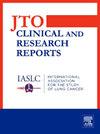Post-discontinuation Survival in Patients With Advanced NSCLC Receiving Immune Checkpoint Inhibitors: A Pooled Analysis of Prospective Cohort Studies
IF 3.5
Q2 ONCOLOGY
引用次数: 0
Abstract
Introduction
The safety of discontinuing immune checkpoint inhibitors (ICIs) because of a durable response in patients with advanced NSCLC remains uncertain, and post-discontinuation survival outcomes based on the reason for cessation are not well defined.
Methods
A pooled analysis was conducted using data from four prospective cohort studies involving 835 patients with advanced NSCLC who discontinued ICIs. Patients were categorized based on discontinuation reasons: durable response; immune-related adverse events (irAEs) (subcategorized by tumor response at discontinuation); non-irAE adverse events; disease progression; and other causes.
Results
Disease progression was the most common reason for ICI discontinuation (N = 528 [63.2%]), followed by irAEs (N = 187 [22.4%]) and tumor response (N = 23 [2.8%]). Regarding response status at ICI discontinuation due to irAEs, complete/partial response (CR/PR) was the most frequent (N = 85), followed by stable disease/not evaluable (SD/NE, N = 69) and disease progression (N = 33). After a median post-discontinuation follow-up of 15.8 months (interquartile range, 6.9–23.2), patients who discontinued because of a response had excellent outcomes, with no deaths and only three progression-free survival events. While post-discontinuation overall survival was comparable between the irAE-CR/PR and irAE-SD/NE groups, ICI therapy ≥12 months was associated with improved post-ICI discontinuation survival in the irAE-CR/PR group.
Conclusions
Discontinuation of ICIs because of a durable tumor response is rare in real-world settings but represents a feasible strategy for patients with advanced NSCLC. Patients in the irAE-CR/PR group had favorable post-ICI discontinuation survival if they received ICI therapy lasting ≥12 months.
接受免疫检查点抑制剂的晚期非小细胞肺癌患者停药后生存率:前瞻性队列研究的汇总分析
在晚期NSCLC患者中,由于持续反应而停用免疫检查点抑制剂(ICIs)的安全性仍不确定,基于停药原因的停药后生存结局也没有很好的定义。方法采用四项前瞻性队列研究的数据进行汇总分析,涉及835例停止使用ICIs的晚期NSCLC患者。根据停药原因对患者进行分类:持续反应;免疫相关不良事件(irAEs)(按停药时肿瘤反应分类);非irae不良事件;疾病进展;还有其他原因。结果疾病进展是ICI停药最常见的原因(N = 528[63.2%]),其次是irAEs (N = 187[22.4%])和肿瘤反应(N = 23[2.8%])。关于因irAEs而停药的缓解状态,完全缓解/部分缓解(CR/PR)最为常见(N = 85),其次是疾病稳定/不可评估(SD/NE, N = 69)和疾病进展(N = 33)。在中位停药后随访15.8个月(四分位数范围为6.9-23.2)后,因缓解而停药的患者有很好的结局,没有死亡,只有3个无进展生存事件。虽然irAE-CR/PR组和irAE-SD/NE组停药后总生存期相当,但irAE-CR/PR组ICI治疗≥12个月与ICI停药后生存期改善相关。结论:由于持久的肿瘤反应而停用ICIs在现实环境中是罕见的,但对于晚期NSCLC患者来说是一种可行的策略。如果接受持续≥12个月的ICI治疗,irAE-CR/PR组患者的ICI停药后生存率较高。
本文章由计算机程序翻译,如有差异,请以英文原文为准。
求助全文
约1分钟内获得全文
求助全文
来源期刊

JTO Clinical and Research Reports
Medicine-Oncology
CiteScore
4.20
自引率
0.00%
发文量
145
审稿时长
19 weeks
 求助内容:
求助内容: 应助结果提醒方式:
应助结果提醒方式:


